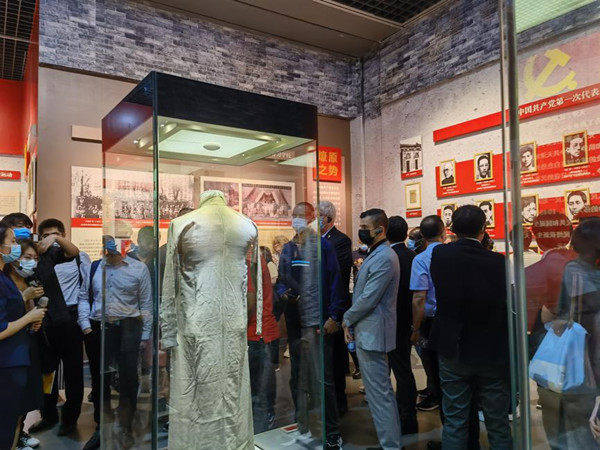
Foreigners visit the Tianjin Museum on Monday. [Photo by Gao Yishan/For chinadaily.com.cn]
Foreign experts, entrepreneurs and students in Tianjin hailed the exhibitions at the Tianjin Museum and the memorial to Zhou Enlai (1898-1976) and his wife, Deng Yingchao (1904-1992) on Monday. The couple were early promoters of Marxism and great revolutionaries before the founding of new China.
The visitors had joined a tour organized by the Tianjin municipal Publicity Department, together with the municipal Education Commission, Bureau of Science and Technology and the Bureau of Commerce.
The museum launched an exhibition on June 18 titled Red Memory: Tianjin Revolutionary Cultural Relics. The memorial to Zhou and Deng had undergone a major face lift in the first half of this year in gearing up for the 100th anniversary of the founding of the Communist Party of China.
Through more than 1,000 exhibits of cultural and historical relics, historical documents, pictures and videos, the exhibition displayed the revolutionary history of the CPC and Tianjin as a heroic city.
The memorial to the couple also exhibited many rare photos and documents for visitors for the first time since the renovation.
The exhibits include Zhou's and Deng's efforts to spread Marxism in Tianjin. Zhou used to study in Tianjin and became the first premier after the founding of new China.
Peter John Rogerson, executive principal of Haileybury International School in Tianjin, was nominated to receive the Tianjin Haihe Friendship Award, the highest award given to foreigners working in the city.
Rogerson hails from Melbourne, Australia, a sister city to Tianjin.
"The relationship has lasted 40 years," he said. "I love Tianjin very much; it's a beautiful city that is very good for foreigners because it's modern. It has lots of gardens and beautiful rivers ... It reminds me a lot of Melbourne, which is also on the river.
"I've seen many museums around China, including the small museum of chairman Mao, the museum that memorializes the first congress of the CPC in 1921 and many other museums.
"But the Tianjin Museum and its exhibition have shown where the CPC came from in the last hundred years of history. The exhibits were put in order in one single timeline. It's very interesting."
Rogerson's first visit to China was in 2002, and his official tenure at the international school began two and a half years ago.
He was impressed by the video about Zhou Enlai, which was broadcast in the Memorial of Zhou Enlai and Deng Yingchao.
"The video was a fantastic life record of a very dedicated man. I didn't know so much about your most famous diplomat and what he's like. What a wonderful life. What a wonderful service he did for the country."
Irina Andreeva, a professor of Russian at Tianjin Foreign Studies University, told China Daily that she has a strong interest in Chinese history and Sino-Russian ties.
"I came to Tianjin in 2013, and I really love Tianjin," she said.
Although she has been to many other Chinese cities, she believes Tianjin is "the best". She has witnessed many changes in the city.
"The sky here is just like the sky in Russia — cloudless, or white clouds floating in the sky. But the people of Tianjin have not changed at all. They are more friendly and very polite," she said, adding that she feels Tianjin is like her hometown.
Kamran Khan, from Pakistan, has just earned his master's degree in electronics at Tianjin University of Technology and Education. He said the visit to the two museums aligned his thinking toward the history of China.
"During the tour I was thinking about the journey — how CPC members started and how they fought for everything, which made a great difference in China. Zhou, especially, did a lot of great things."
Tola Tsegaye Alemu, a postgraduate student at Tianjin University of Technology and Education, carefully taking photos of the exhibitions in the Memorial of Zhou Enlai and Deng Yingchao, said that "Zhou was definitely an amazing leader of China in the last century. The pictures also show the close relations between China and my motherland, Ethiopia, where Zhou paid a visit to in 1964. … These historical materials are quite valuable," he said.
"To me, Tianjin is a significant city that has given me the opportunity to learn about EPIP and other courses in the Luban Workshop's Ethiopia Training Program. During today's tour I've seen numerous new techniques. Tianjin is so impressive and quite different from its condition 60 years ago. The development of this seaside city is beyond imagination, and I'm glad to witness all these changes."
EPIP refers to engineering, practice, innovation and project and is an educational model initiated by Tianjin educational authorities five years ago to operate the Luban Workshop, which is designed to offer high-end Chinese technical skills training that can help overseas college students meet the requirements of the emerging global market.



